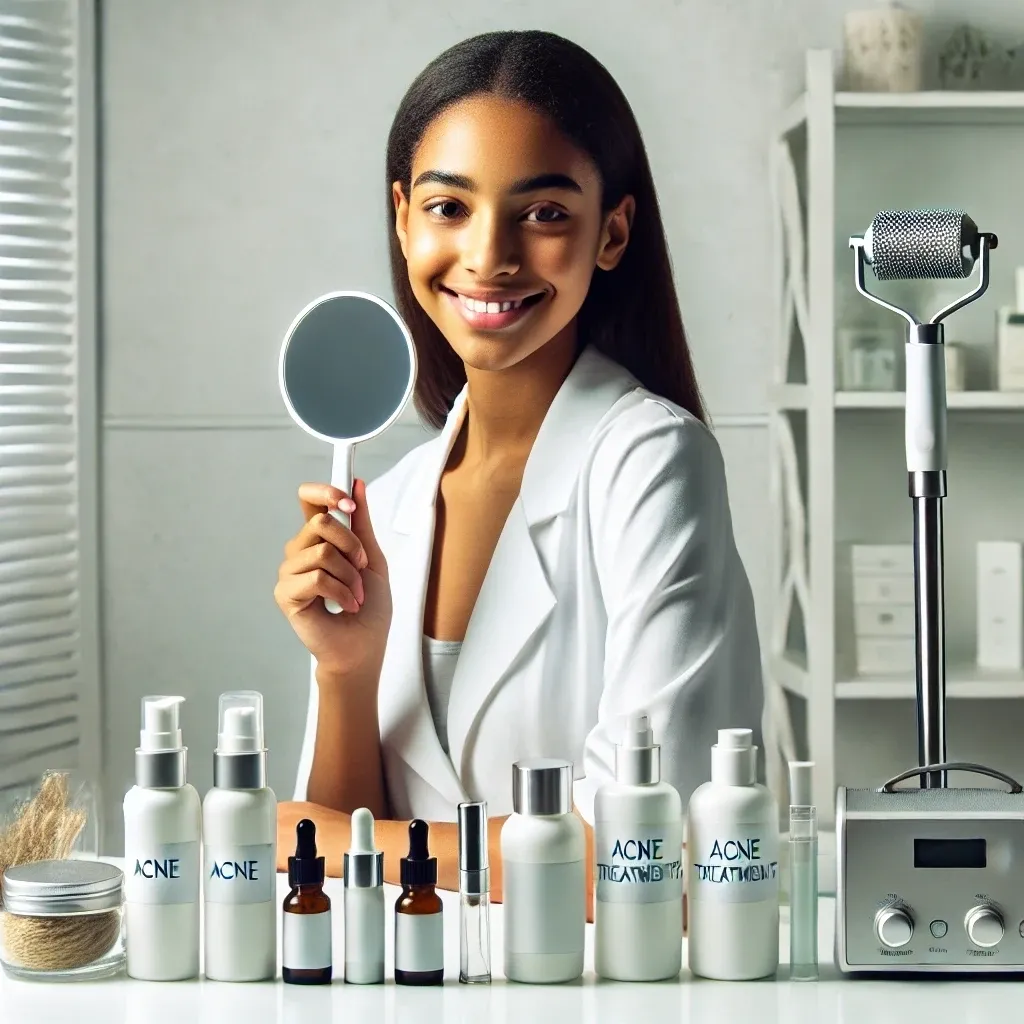The Ultimate Guide to Acne Treatments: From Topicals to Procedure

Acne is one of the most common skin conditions, affecting individuals of all ages worldwide. While often associated with adolescence, many adults continue to struggle with acne breakouts and the lingering effects of acne scars. Understanding the various treatment options can empower you to take control of your skin health. This comprehensive guide will explore everything from lifestyle changes and topical treatments to advanced in-office procedures available at Dr. Janet Vafaie’s clinic.
Understanding Acne
What Is Acne?
Acne occurs when hair follicles become clogged with oil (sebum) and dead skin cells, forming whiteheads, blackheads, pimples, and even cystic lesions. These blemishes commonly appear on the face, forehead, chest, upper back, and shoulders. Acne can be persistent and, if not treated properly, may lead to scarring and emotional distress.
Causes of Acne
Several factors contribute to the development of acne:
- Hormonal Changes: Fluctuations in hormones, especially during puberty, menstruation, or pregnancy, can increase sebum production.
- Genetics: A family history of acne increases your likelihood of developing it.
- Diet: Certain foods, particularly those high in refined sugars and dairy, may exacerbate acne.
- Stress: While stress doesn’t cause acne, it can worsen existing conditions by prompting the body to produce more androgens, stimulating oil glands.
Understanding these causes is the first step toward effective treatment and prevention.
Lifestyle Changes to Manage Acne
Diet and Nutrition
Your diet plays a significant role in skin health. Consuming a balanced diet rich in whole foods can help manage acne symptoms. Foods high in antioxidants, such as fruits and vegetables, combat inflammation and support skin repair. Limiting intake of high-glycemic foods and dairy may reduce breakouts for some individuals.
Skincare Routine
Establishing a consistent skincare routine is crucial. Gently cleansing the skin twice daily removes excess oil and impurities without stripping the skin’s natural moisture barrier. Using non-comedogenic (non-pore-clogging) products helps prevent new blemishes from forming. Regular exfoliation with mild agents can promote cell turnover and reduce clogged pores.
Stress Management
Managing stress is essential for overall health and can positively impact acne. Meditation, yoga, deep-breathing exercises, and regular physical activity help reduce stress hormones that may trigger oil production and inflammation.
Over-the-Counter Treatments
Benzoyl Peroxide
Benzoyl peroxide is a powerful antibacterial agent that kills acne-causing bacteria on the skin’s surface. It’s available in various concentrations and formulations, including gels, creams, and cleansers. While effective, it can cause dryness and irritation; starting with a lower concentration and gradually increasing usage can help minimize side effects.
Salicylic Acid
Salicylic acid is a beta-hydroxy acid that penetrates oily skin and clogged pores, promoting the exfoliation of dead skin cells. It’s particularly effective for treating blackheads and whiteheads. Regular use can prevent pore blockage, but it may cause mild irritation for those with sensitive skin.
Sulfur-Based Products
Sulfur reduces oiliness and helps unclog pores. It is often combined with other ingredients to enhance its efficacy. Sulfur-based treatments can be a good option for individuals with sensitive skin who cannot tolerate stronger medications.
Prescription Medications
Topical Retinoids
Topical retinoids, such as tretinoin, adapalene, and tazarotene, are derived from vitamin A. They promote cell turnover and prevent hair follicles from becoming plugged. They are highly effective but may cause skin irritation, redness, and increased sensitivity to sunlight. Using sunscreen daily is essential when using retinoids.
Topical Antibiotics
Medications such as clindamycin and erythromycin reduce bacteria and inflammation in the skin. They are often combined with benzoyl peroxide to enhance effectiveness and prevent antibiotic resistance.
Oral Antibiotics
Oral antibiotics like doxycycline and minocycline can reduce bacteria and fight inflammation from within for moderate to severe acne. They are typically used for a limited duration to prevent antibiotic resistance and are often combined with topical treatments.
Hormonal Treatments
In cases where acne is linked to hormonal fluctuations, particularly in women, hormonal treatments like birth control pills or anti-androgens (e.g., spironolactone) can be effective. These medications regulate hormone levels, reducing sebum production and acne breakouts.
Advanced In-Office Procedures
Chemical Peels
Chemical peels involve applying a solution to the skin that causes it to exfoliate and eventually peel off, revealing new, regenerated skin. This treatment can reduce acne lesions and improve the appearance of scars and hyperpigmentation. Our Malibu and Los Angeles dermatologist clinics offer customized chemical peels to suit your skin needs.
Laser and Light Therapies
Laser treatments target the deeper layers of the skin without damaging the surface. They reduce oil production, kill acne-causing bacteria, and stimulate collagen production for improved skin texture. Our SculpSure® Laser Treatments provide innovative solutions for acne and acne scarring.
Microdermabrasion and Dermabrasion
These exfoliating treatments remove the outermost layer of dead skin cells, promoting new cell growth. Microdermabrasion uses a minimally abrasive instrument for superficial exfoliation, suitable for mild acne and light scarring. Dermabrasion is a more intensive procedure that targets deeper scars and is performed under local anesthesia.
Cortisone Injections
For severe cystic acne, cortisone injections can quickly reduce inflammation and pain. A diluted corticosteroid is injected directly into the cyst, leading to rapid improvement. To avoid potential side effects, a qualified dermatologist should only perform this procedure.
Combining Treatments for Optimal Results
Combining different treatments can enhance effectiveness and address multiple acne-causing factors simultaneously. For example, pairing a topical retinoid with an oral antibiotic can reduce bacteria and prevent clogged pores. It’s essential to work with a dermatologist to develop a personalized treatment plan that considers your skin type, severity of acne, and lifestyle.
Why Choose Dr. Janet Vafaie’s Clinic
We are committed to providing comprehensive care for all your dermatological needs. Our Medical and Cosmetic Dermatology expertise allows us to offer a full spectrum of acne treatments, from prescription medications to advanced laser therapies. Our personalized approach ensures that each patient receives a treatment plan tailored to their unique skin concerns.
Frequently Asked Questions
How long does it take to see results from acne treatments?
Results vary depending on the treatment and individual skin response. Over-the-counter treatments may take 4-8 weeks to show improvement, while prescription medications can take up to 12 weeks. In-office procedures may offer quicker results but often require multiple sessions for optimal outcomes.
Can diet really affect my acne?
While the relationship between diet and acne isn’t fully understood, some studies suggest that high-glycemic foods and dairy products may exacerbate acne in certain individuals. Maintaining a balanced diet rich in whole foods can support overall skin health.
Is it safe to combine multiple acne treatments?
Combining treatments can be effective but should be done under the guidance of a dermatologist to avoid skin irritation or adverse reactions. Your dermatologist can help develop a safe and effective treatment regimen tailored to your needs.
Are there side effects to acne medications?
Some acne medications can cause side effects such as dryness, redness, peeling, or increased sensitivity to sunlight. Following your dermatologist’s instructions and reporting any severe or persistent side effects is important.
When should I see a dermatologist for my acne?
If over-the-counter treatments aren’t effective after several weeks, or if your acne is severe, causing scarring, or affecting your self-esteem, it’s advisable to consult a dermatologist. Professional guidance can help you achieve clearer skin more effectively.
External Resources
- American Academy of Dermatology: Acne Resource Center
- Mayo Clinic: Acne Treatments and Drugs
Take the Next Step Towards Clear Skin
Acne doesn’t have to be a persistent problem. With the right combination of treatments and professional guidance, you can achieve clearer, healthier skin. At Dr. Janet Vafaie’s clinic, we’re dedicated to helping you find the most effective solutions tailored to your unique needs. Contact us today to schedule a consultation and take the first step toward a confident, acne-free future.
For more insights on skin health and treatments, visit our Tips & Articles page.
